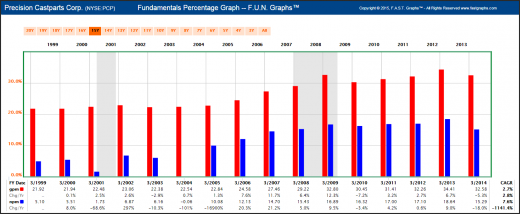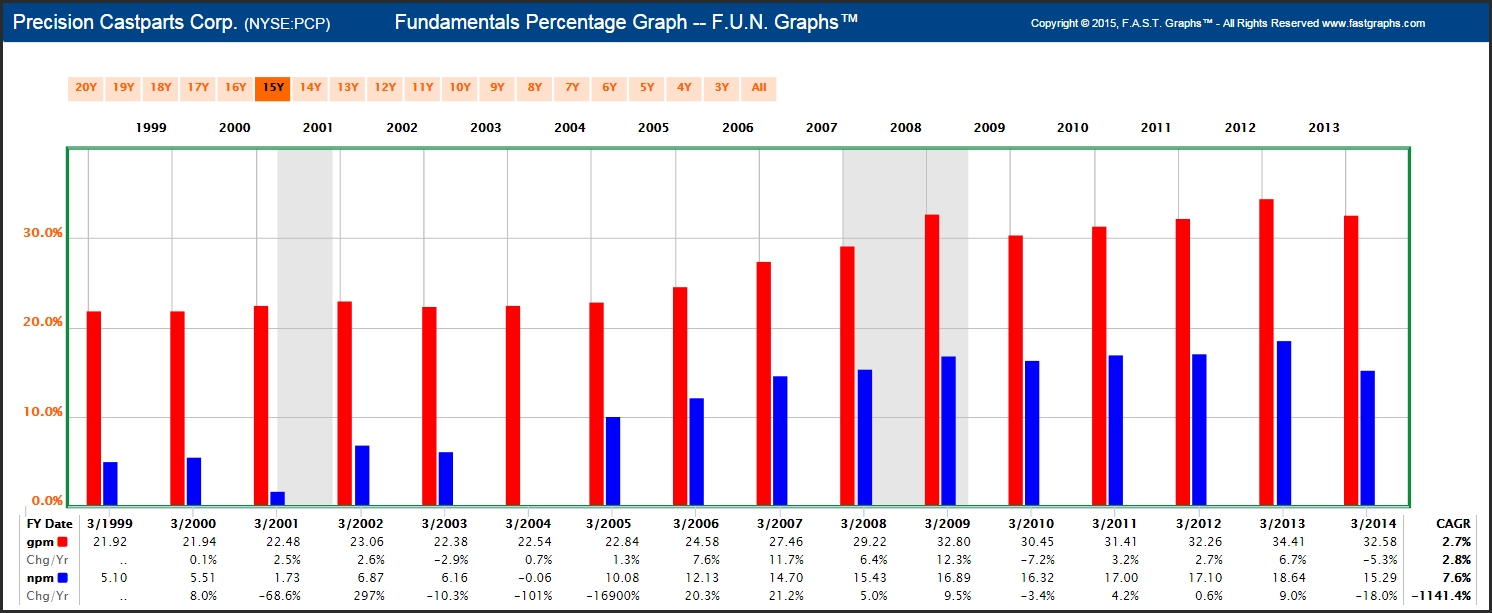Was Warren Buffett a True Value Investor When He Bought Precision Castparts?
August 18, 2015
Introduction
When I first got interested in investing in common stocks some 50 years ago, I thought it would be wise to research and then study the investing behaviors and philosophies of the recognized investor greats. My efforts first led me to Ben Graham, and from there to many other famous value investors such as Philip Fisher, Walter Schloss, William J. Ruane, Irving Kahn, Peter Lynch, and of course the venerable and perhaps most famous of all, Warren Buffett.
Although each of these investing greats had their own unique style and approach, they were all investors that focused on value. Consequently, I patterned my own investment philosophies and beliefs on sound valuation. Admittedly, assessing sound valuation is not a perfect science. However, there are certain fundamental principles that do apply and have passed the test of time. One of those principles is to be only willing to invest when fundamentals, primarily earnings, can be purchased at a price that makes economic sense.
Does Warren’s Purchase of Precision Castparts Make Economic Sense?
(August 18, 2015), Seeking Alpha reported on Warren Buffett’s purchase of Precision Castparts Corp (PCP) under the following headline: “Buffett pays high price for Precision Castparts.”
There were several links in the report, but this one suggested that Warren was paying a P/E ratio of 18×1 year’s forward earnings:
“It’s the biggest deal of Warren Buffett’s career: BRK is paying $ 235/share for PCP, a 21.2% premium over Friday’s closing price and 18x projected profit over a 12-month period.”
Since I’ve been a long-term follower of Warren Buffett, I thought it would be interesting to evaluate Warren’s purchase through the lens of the F.A.S.T. Graphs™ fundamentals analyzer software tool. My first graph produces a look at the company’s earnings and dividends only (yes, PCP does pay a miniscule dividend). What we discover is a reasonably consistent record of operating earnings growth averaging 15.6% since 2003. Although there is minor cyclicality along the way, Precision Castparts has been a very profitable enterprise. Note that although earnings fell in 2009, the company remained highly profitable even during the Great Recession.

With my second graph, I bring in monthly closing stock prices (the black line) and a calculation of the historical normal P/E ratio (the dark blue line). It’s interesting to note that since 2003 Precision Castparts’ stock price has been awarded a normal P/E ratio of 18.2, which is the multiple of the dark blue line across the entire graph.
What I found interesting is that coming off of excessive valuation in 2013, Precision Castparts’ stock price fell precipitously throughout all of 2014 and prior to Warren’s purchase throughout 2015. At the beginning of 2015 the stock price went right on through the historical normal P/E ratio of 18, and just prior to being purchased by Warren Buffett was trading at a theoretical fair value blended P/E ratio of 15.4.

However, what I found most interesting is that the price that Warren Buffett is paying brings the stock price into alignment with its historical normal P/E ratio. Personally, I do consider that a moderately steep price to pay. On the other hand, perhaps it’s not too high considering he’s buying the entire company.

When I examined the associated performance report with the above graph, it provided additional perspective on why Warren Buffett might have been interested. This high-quality aerospace and defense company has dramatically outperformed the average company as measured by the S&P 500 since 2003. However, Warren Buffett’s purchase did provide a nice boost to the historical returns of long-term shareholders.

At its closing price on August 7, 2010, Precision Castparts was trading at a blended fair value P/E ratio of 15.4. Once again, this is below the historical normal P/E ratio of 20.3 since fiscal year 2011.

Consequently, an argument could be made that Warren Buffett is paying a slight discount to the company’s historical normal P/E ratio over the past 5 or 6 years. I’m not suggesting that he’s buying the company cheap, I’m simply pointing out that relative to historical norms, it doesn’t appear that he is overpaying either.

Next I thought it would be interesting to do a quick examination of Precision Castparts’ historical gross (gpm) and net profit margins (npm). I chose the period 1999 to present in order to offer a perspective on whether margins were improving or declining. Interestingly, Precision Castparts’ gross and net profit margins have been on the upswing over the past 6 or 7 years.

Warren Buffett often talks about the book value of Berkshire Hathaway in his reports. Therefore, I thought it might be interesting to look at Precision Castparts’ book value (common equity per share-ceps). As of the end of fiscal year March 2015, Precision Castparts’ book value was $ 76.64. Consequently, Warren Buffett is paying approximately 3 times book, which I don’t consider a steep price for such a strong profit growth company.

Precision Castparts has also seen strong growth in assets per share (atps) since fiscal year March 2009. As of the end of fiscal year March 2015, Precision Castparts had assets of $ 136.24 per share.

Finally, I took a look at Precision Castparts’ revenues since fiscal year-end March 2009. Once again, I discovered strong double-digit average growth of revenues.

Summary and Conclusions
Warren Buffett has indicated that he will utilize about $ 23 billion of Berkshire Hathaway’s cash and borrow $ 10 billion to fund the approximately 97% of Precision Castparts that he did not already own. Although I do not feel that he necessarily stole the company, considering that he is purchasing the entire enterprise the deal seems to make sense, and is just what I would expect from Warren Buffett. Therefore, to answer the question posed in the article title, it appears that Warren Buffett has been true to his value investing principles. Regardless of how the reader may feel, I hope this presentation provided some additional insights into the mind and investing strategy of the venerable Warren Buffett.
Disclosure: No position at the time of writing.
Disclaimer: The opinions in this document are for informational and educational purposes only and should not be construed as a recommendation to buy or sell the stocks mentioned or to solicit transactions or clients. Past performance of the companies discussed may not continue and the companies may not achieve the earnings growth as predicted. The information in this document is believed to be accurate, but under no circumstances should a person act upon the information contained within. We do not recommend that anyone act upon any investment information without first consulting an investment advisor as to the suitability of such investments for his specific situation.
Business & Finance Articles on Business 2 Community
(102)



